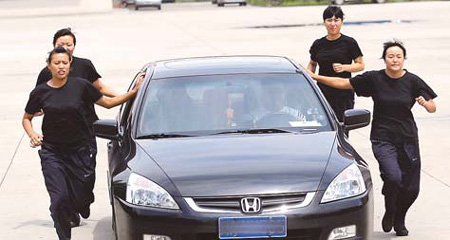Bodyguards in line of hire for more people
Increasing security concerns mean brisk business for related services.
Zhang Li turned around and looked at the two muscular men hiding in the shadows, trying to act as inconspicuous as possible. Although they pretended to be reading newspapers, she knew they were watching her every move.
"I call them shushu, my uncles," said the 7-year-old. Her mother calls them her bodyguards.
With her rosy cheeks, pigtails and bright pink rucksack, Zhang looks like every other first-grader as she skips through the gates of her primary school in downtown Shanghai. What sets her apart is her entourage.
"We're her secret escorts," said Zhou Jie from CCG Security, the company hired to protect the girl from her divorced father.
In the last two years, the 26-year-old martial arts expert has guarded visiting royals from the Middle East, celebrities and company CEOs. "But it is the first time I've protected an ordinary family," he said.
Once the preserve of the rich and famous, a shift in China's traditional customer base has led to a boom in demand for bodyguards. As the nation's wealth has grown, Chinese security firms say they are witnessing a surge in middle-class families using their services.
CCG Security, one of the market leaders, protected at least a dozen clients with annual salaries of roughly 400,000 yuan ($60,000) last year. In the last 12 months, that client list has more than trebled in size.
"More people are calling all the time," said Zhou, who explained most inquiries are about temporary protection during family or property disputes.
Zhang Li's mother (who did not want her daughter's real name used), a manager at a multinational company, called after a bitter breakup from her husband.
She hired four bodyguards to watch the schoolgirl around the clock in pairs, with each receiving 200 yuan an hour. They were given pictures of several people forbidden from coming into contact with Zhang and told to "be invisible" unless called on.
"The furious father arrived one day and tried to get into their apartment," said Zhou. "We ushered him out (of the building) and persuaded him to leave."
On a previous assignment, Zhou and four colleagues guarded the wife and child of a 40-year-old man whose pregnant mistress had threatened to expose their affair. After two weeks, the mistress "gave up and agreed to have an abortion", recalled Zhou.
Zhang Hong, a professor at the Chinese People's Public Security University, said he believes demand for such services will only increase in the future.
"We'll soon be seeing bodyguards accompanying elderly women to the bank, escorting office women as they house hunt or guard after children while their parents are away," he said.
Experts say the growing ranks of nouveau riche have a greater awareness about safety, although many predict that conflicts between individuals and businesses will only increase as society develops and the wealth gap widens.
"Now people are more satisfied (with their living standards), they care more about safety," added Zhang Hong.
Jin Yi Safety and Guard Technology, also in Shanghai, has received several calls this year from wives looking for protection as they divorce violent husbands. Two company employees also recently accompanied a home-owner to reclaim a property from tenants who refused to leave.
This diversity in customer requirements, which has been steadily growing over the last few years, follows a trend seen across the globe, according to a Jin Yi manager who gave his name as Feng.
"Our clients are usually white-collar workers who have a higher than average income," he said.
 0
0 








Go to Forum >>0 Comments